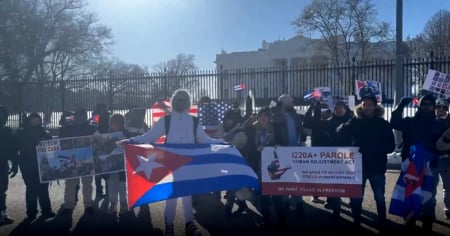The U.S. Department of Homeland Security (DHS) began notifying migrants who arrived in the country as beneficiaries of the humanitarian parole implemented by the Joe Biden administration that their status has been revoked and they must self-deport.
According to the statement sent electronically this Friday to Cubans, Haitians, Nicaraguans, and Venezuelans who are beneficiaries of the humanitarian parole program, they are warned that they must leave the country voluntarily or face detention and expulsion.
According to the text shared on the social media accounts of American journalists, migrants must leave the country before the designated deadline.
"Your parole will end on the first of the following dates: (1) the expiration date of your original parole or (2) April 24, 2025. You must leave the United States now, but no later than the expiration date of your parole. Failing to leave on time may have adverse immigration consequences," reads the order.
The text warns that, starting from the expiration date of the parole, the migrant may be subject to expedited removal, in accordance with section 235 of the Immigration and Nationality Act (INA), or may face removal proceedings under section 240 of the INA.
"Any of which may result in their expulsion, unless they have left the United States or obtained a legal basis to remain within the United States," he argues.
At the same time, it emphasizes that if migrants have not obtained a legal basis to remain in the country, and do not leave the United States before the expiration date of the parole, they will start to accumulate "illegal presence in the United States", unless they are "otherwise protected against such accumulation."
"The accumulation of more than 180 days of illegal presence followed by departure from the United States may lead to being inadmissible if one applies for re-entry within a specified timeframe after leaving," the text states.
On the other hand, it is necessary to specify that if the exit from the country is by land, the departure must be reported once outside the United States and through the CBP Home mobile application.
Revocation of employment authorization
The notice of termination of the parole is also accompanied by a notification of the revocation of employment authorization based on parole.
This benefit, which is dependent on parole, has also been terminated, as stated in the document sent to migrants.
"The DHS notifies its intention to revoke your employment authorization based on parole pursuant to 8 CFR 274a.12(c)(11). The DHS intends to revoke your employment authorization because the condition under which the employment authorization based on parole was granted —having been admitted to the United States under section 212(d)(5)(A) of the INA— no longer exists," states the order.
If the parole-based authorization has not expired, it will be revoked as of April 24, 2025, unless contradictory evidence is presented showing that you continue to be under parole in the United States, pursuant to section 212(d)(5)(A) of the INA.
However, the presentation of contradictory evidence does not affect the termination of the parole originally granted under the humanitarian parole programs for Cuba, Haiti, Nicaragua, or Venezuela.
The uncertainty following the end of parole
On March 25, 2025, the U.S. Department of Homeland Security ended the parole programs for foreign nationals from Cuba, Haiti, Nicaragua, and Venezuela, as well as for their immediate family members.
Implemented in 2023 by the government of former president Joe Biden, under this program more than 532,000 people entered the United States. The parole allowed Cubans to arrive in the U.S. with a temporary stay permit, provided they had a financial sponsor in the country.
The cancellation of the parole mainly affects those who have not yet applied for permanent legal status, such as political asylum or residency through the Cuban Adjustment Act.
Most of the Cubans who entered the country under this program have already applied for or received permanent residency through the Cuban Adjustment Act. However, it is estimated that around 26,000 Cubans who arrived after March 2024 still do not meet the one-year physical presence requirement necessary to benefit from this law, leaving their immigration status in limbo.
Filed under:
